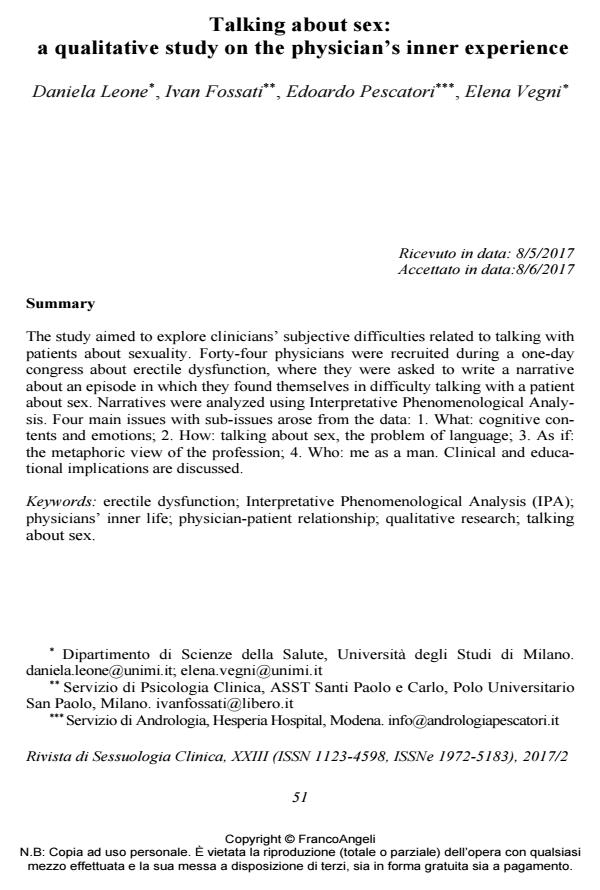Talking about sex: a qualitative study on the physician’s inner experience
Titolo Rivista RIVISTA DI SESSUOLOGIA CLINICA
Autori/Curatori Daniela Leone, Ivan Fossati, Edoardo Pescatori, Elena Vegni
Anno di pubblicazione 2017 Fascicolo 2017/2
Lingua Inglese Numero pagine 19 P. 51-69 Dimensione file 258 KB
DOI 10.3280/RSC2017-002004
Il DOI è il codice a barre della proprietà intellettuale: per saperne di più
clicca qui
Qui sotto puoi vedere in anteprima la prima pagina di questo articolo.
Se questo articolo ti interessa, lo puoi acquistare (e scaricare in formato pdf) seguendo le facili indicazioni per acquistare il download credit. Acquista Download Credits per scaricare questo Articolo in formato PDF

FrancoAngeli è membro della Publishers International Linking Association, Inc (PILA), associazione indipendente e non profit per facilitare (attraverso i servizi tecnologici implementati da CrossRef.org) l’accesso degli studiosi ai contenuti digitali nelle pubblicazioni professionali e scientifiche.
The study aimed to explore clinicians’ subjective difficulties related to talking with patients about sexuality. Forty-four physicians were recruited during a one-day congress about erectile dysfunction, where they were asked to write a narrative about an episode in which they found themselves in difficulty talking with a patient about sex. Narratives were analyzed using Interpretative Phenomenological Analysis. Four main issues with sub-issues arose from the data: 1. What: cognitive contents and emotions; 2. How: talking about sex, the problem of language; 3. As if: the metaphoric view of the profession; 4. Who: me as a man. Clinical and educational implications are discussed.
L’obiettivo del presente lavoro è quello di esplorare le difficoltà dei clinici nel par-lare con i pazienti di tematiche riguardanti la sessualità. Quarantaquattro medici sono stati reclutati durante una giornata di congresso sulla disfunzione erettile, du-rante la quale è stato chiesto loro di scrivere una narrazione su un episodio in cui si sono trovati in difficoltà a parlare di sesso con il paziente. Le narrazioni sono state analizzate utilizzando l’Analisi Interpretativa Fenomenologica. Dall’analisi dei dati sono emerse quattro tematiche principali, con relative sotto-tematiche: 1. Cosa: contenuti cognitivi ed emozioni; 2. Come: parlare di sesso, il problema del linguaggio; 3. Come se: la prospettiva metaforica della professione; 4. Chi: io come uomo. Le implicazioni cliniche e formative dei risultati sono state infine discusse.
Parole chiave:Analisi Interpretativo Fenomenologica; disfunzione erettile; mondo interno del medico; parlare di sesso; relazione medico-paziente; ricerca qualitativa.
Daniela Leone, Ivan Fossati, Edoardo Pescatori, Elena Vegni, Talking about sex: a qualitative study on the physician’s inner experience in "RIVISTA DI SESSUOLOGIA CLINICA" 2/2017, pp 51-69, DOI: 10.3280/RSC2017-002004